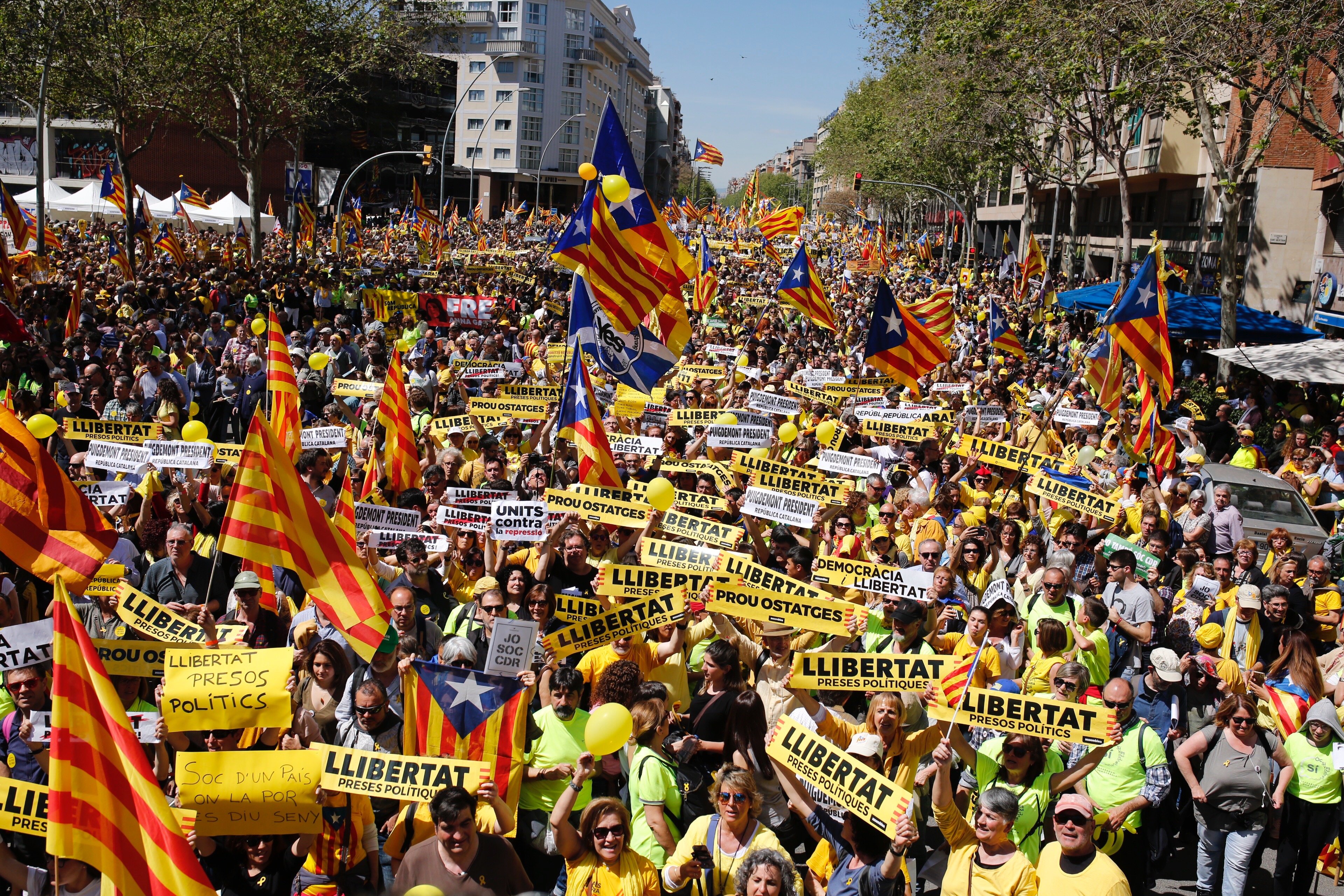Many thousands of people filled the streets of Barcelona this Sunday at midday to demand the release of the Catalan political prisoners and to reclaim democracy and basic freedoms, almost six months to the day after the imprisonment of Catalan pro-independence civil leaders, Jordi Sànchez, ex-president of the Catalan National Assembly (ANC), and Jordi Cuixart, president of Òmnium Cultural. It was an authentic tide of yellow, in a demonstration which attracted a response from beyond the pro-independence sphere, also incorporating the major trade unions and the non-aligned Commons political group, and which filled the major Barcelona artery Avinguda Paral·lel from Plaça Espanya to the harbour. City police estimated attendance at 350,000, while the organizers said that 750,000 people took part.
The demonstration had been called by Espai Democràcia i Convivencia, a platform bringing together the pro-independence groups, the major trade unions such as UGT and CCOO and employer associations, under the slogan For rights and freedoms, for democracy and cohesion, we want you home! At the head of the demonstration, alongside the families of the prisoners and the heads of the organisations forming the platform, were the two senior Catalan authorities currently in office: the speaker of the Catalan Parliament, Roger Torrent, and the mayor of Barcelona, Ada Colau, along with other political representatives and MPs.
"We are brought together by the need to make a unitary response in defence of Catalan institutions, of fundamental rights, of the right of Catalans to decide their political future and of democracy", were the words from the march's unitary manifesto, read from the stage at the end of the massive march.
Txell Bonet, wife of Jordi Cuixart, and Oriol Sànchez, son of Jordi Sànchez, read messages to the crowd from the Òmnium and ANC leaders currently in Madrid's Soto del Real prison.
Cuixart stressed the unity of the Catalan people within their diversity in moments of great difficulty and injustice caused “by the authoritarian drift of a state that is more and more internationally isolated, by the unjustified imprisonments and by the unprecedented suspension of Catalonia's self-government”. At the same time, however, he underlined the hope he retains thanks to the people, “the true engine of the struggle for democracy and freedom, hope in the incorruptible dignity of Catalan society and in a future without giving in or giving up”. He concluded appealing for "Unity, dignity and courage, and I would add love, the great love that you are showing for us.”
"We are not afraid, we have the right to be free. In our name, you are carrying the springtime of republican smiles to all corners of the country”, said Sànchez, mentioning that Catalonia had held the largest, most civic and peaceful mobilizations in Europe. The ex-president of the ANC asked the marchers to “never give in to blackmail” in the face of the “impotence and rage” of a state that blames them for violence and tumultuous uprisings that it has invented. “An authoritarian state will never deserve to govern a free people”, he declared.
The manifesto signed by the organizers states the concern for the “violation of fundamental rights and democratic freedoms, and the social polarization produced in the current situation”; it calls for a political and non-repressive answer to political problems; it asks Catalan society “to respond in a peaceful and firm way in defence of Catalan institutions” with respect for diversity and fundamental rights, in favour of dialogue; and commits those signing the document to respond in a coordinated way in the face of any action that tramples on fundamental rights. “In the face of these developments we do not discard any peaceful form of mobilization and response from the country”, it reads.
The text asks for a Catalan president to be chosen urgently “without political or juridical interferences”, as an expression of the will of the majority expressed in the Catalan election of 21st December, to constitute a new Catalan government which can exercise its full competences and to reinstate the normal functioning of the institutions.
It rejects the judicialization of politics, it warns that legal charges and orders of preventive detentions are aggravating the situation and it describes as "extremely grave” that accusations of terrorism and rebellion are being used to pursue citizens who demonstrated non-violently. Likewise, it expresses concern for the investigations of and sentences against artists, union leaders and activists who were exercising their freedom of expression and demonstration.
As well as recalling the imprisonment of Sànchez and Cuixart, the document refers to the imprisoned ex-speaker of the Catalan Parliament, Carme Forcadell, and the jailed members of the Catalan government, vice president Oriol Junqueras, and ministers Joaquim Forn, Jordi Turull, Josep Rull, Raül Romeva and Dolors Bassa.
More than 900 coaches travelled to the march from all over Catalonia in what it was hoped would be a internationally-resounding message for the freedom of the Catalan prisoners. "Freedom for the political prisoners" and "Puigdemont, president" were some of the most chorused chants by marchers at the huge gathering. The event also featured performances by La Dharma, la Folie and Roger Mas.
The intense spring sun that bathed Barcelona this Sunday, the huge crowd and the considerable wait for a march that began late and finished at two in the afternoon provoked a large number of faintings and other medical incidents.

